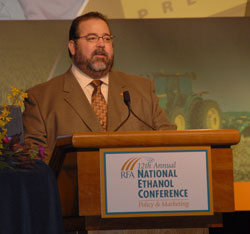The theme was Agriculture at the Crossroads — Energy, Farm & Rural Policy and it was obvious that energy was the headliner at USDA’s 2007 Outlook Forum last week.
The plenary session of the Forum featured some of the top names in agribusiness – ADM CEO Patricia Woertz, Cargill president Greg Page and CHS president John Johnson, together with Red Caveney of the American Petroleum Institute. The panel was moderated by Scott Kilman of the Wall Street Journal.
 Woertz started off by saying that ADM intends to use a “holistic” approach to meet food and energy needs. “Our approach is to see these global needs–for food, heat, light, mobility, security and a healthy environment holistically. To see them all as fundamental human needs, that are—in fact— interconnected.”
Woertz started off by saying that ADM intends to use a “holistic” approach to meet food and energy needs. “Our approach is to see these global needs–for food, heat, light, mobility, security and a healthy environment holistically. To see them all as fundamental human needs, that are—in fact— interconnected.”
Page stated that Cargill’s philosophy was based on “balancing our agri-foods and biofuels businesses in a way that helps meet our vision of nourishing people. For us, this balance is best maintained through policies that are market-driven, trading arrangements that are open and compliant with existing agreements, and production and use that benefits the environment.”
Johnson compared the current biofuels boom to reality television. “If American Idol is the most watched television program in the country, I think its fair to say that energy, global warming and renewable fuels are now among the most watched topics in our nation.” Johnson went on to urge more incentives for new technology over mandates to increase alternative fuel use.
As a reality check, Caveney told members of the Outlook Forum that it is unlikely the United States will ever be totally independent of the need for foreign oil. He said there are three ways the industry can provide energy security – efficiency, technology and diversity.
“First, America’s energy companies must continue to improve their own energy efficiency, and encourage energy efficiency in other industries and by the American people; second, we must increase the use of advanced energy technologies that allow us to develop our resources cleanly and responsibly; and third, we must increase the diversity of our oil and natural gas supplies, both here at home and from around the world, while alternative and renewable sources of energy continue their rapid rates of growth.”
All presentations from the Forum are available in webcast and text form on the USDA website.
USDA Radio has several reports from the Forum:
 Woertz (1 min MP3)
Woertz (1 min MP3)
 Page (1 min MP3)
Page (1 min MP3)
 Johnson (1 min MP3)
Johnson (1 min MP3)
 Caveney (1 min MP3)
Caveney (1 min MP3)
 The plant will produce up to five megawatts of electricity and will run on biodiesel from a Safe Renewables Corp. refinery just two miles away:
The plant will produce up to five megawatts of electricity and will run on biodiesel from a Safe Renewables Corp. refinery just two miles away:

 Imperium Renewables has announced it has achieved a BQ-9000 certification for its Seattle-based refineries.
Imperium Renewables has announced it has achieved a BQ-9000 certification for its Seattle-based refineries.  To anyone concerned about high grain prices, the impact of biofuels on the livestock industry, or whether we will have enough corn to meet all needs, Dean Kleckner has just one message: “Let the market sort it out.”
To anyone concerned about high grain prices, the impact of biofuels on the livestock industry, or whether we will have enough corn to meet all needs, Dean Kleckner has just one message: “Let the market sort it out.”

 According to
According to  The Renewable Fuels Association and the Energy Information Administration announced today that production of ethanol in 2006 reached 4.86 billion gallons… up 24.3% percent from 2005. Likewise, demand for ethanol is up by a third during the same time period.
The Renewable Fuels Association and the Energy Information Administration announced today that production of ethanol in 2006 reached 4.86 billion gallons… up 24.3% percent from 2005. Likewise, demand for ethanol is up by a third during the same time period. “America’s ethanol industry is clearly stepping up to fulfill increased ethanol demand and help address the need to reduce America’s dependence on foreign oil,” said RFA President Bob Dinneen. “The nearly 25 percent increase in ethanol production over last year is consistent with the type of growth our industry has experienced in recent years and this growth will continue. The bottom line is America’s ethanol industry is up to the challenges that lie before us.”
“America’s ethanol industry is clearly stepping up to fulfill increased ethanol demand and help address the need to reduce America’s dependence on foreign oil,” said RFA President Bob Dinneen. “The nearly 25 percent increase in ethanol production over last year is consistent with the type of growth our industry has experienced in recent years and this growth will continue. The bottom line is America’s ethanol industry is up to the challenges that lie before us.”
 Woertz started off by saying that ADM intends to use a “holistic” approach to meet food and energy needs. “Our approach is to see these global needs–for food, heat, light, mobility, security and a healthy environment holistically. To see them all as fundamental human needs, that are—in fact— interconnected.”
Woertz started off by saying that ADM intends to use a “holistic” approach to meet food and energy needs. “Our approach is to see these global needs–for food, heat, light, mobility, security and a healthy environment holistically. To see them all as fundamental human needs, that are—in fact— interconnected.” School administrators might want to mark Tuesday, March 13th on their calendars as the Alternative Fuel Vehicle Institute holds the AFV School Bus Connection webcast from 10:30 a.m.-noon PST.
School administrators might want to mark Tuesday, March 13th on their calendars as the Alternative Fuel Vehicle Institute holds the AFV School Bus Connection webcast from 10:30 a.m.-noon PST.